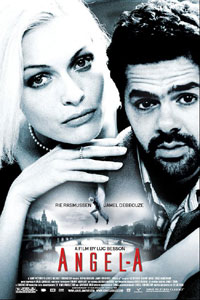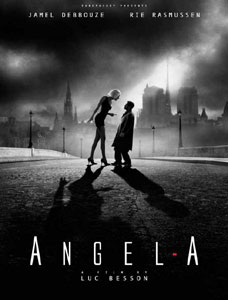 A Moroccan in Paris, Andre Momond (Jamel Debbouze), is beaten up by street gangsters, as he's an incompetent scam artist deep in debt to a loansharks.
A Moroccan in Paris, Andre Momond (Jamel Debbouze), is beaten up by street gangsters, as he's an incompetent scam artist deep in debt to a loansharks.
When the street thugs are finished with him & let him go, a slightly more upscale gangster catches him & nearly throws him off the Eiffel Tower.
Andre's such a likeable rogue it's tough to see him failing so badly at his European life. He can't pay dangerous people he has indebted himself to, so it seems likely one or another of his debtors will kill him in time.
He makes it through that night at wit's end & despairing. He decides to jump off a bridge, but ends up saving an amazonian blonde who is seemingly trying to do herself in by the same means, but really just forcing him to make another decision in life.
Andre has just met the film's titular heroine, Angel-A (2005), played by Rie Rasmussen, star & director of Human Zoo (2008). We're in a rather punky hip version of It's a Wonderful Life (1946).
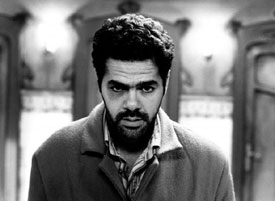 Angel-A is a giantess with a punk model's good looks. Since he "saved" her, she tells him she'll stay by him & obey him & they'll fix each other up. Angel-A is a giantess with a punk model's good looks. Since he "saved" her, she tells him she'll stay by him & obey him & they'll fix each other up.
We can only guess at this stage she's a literal guardian angel, but whether or not that was true, she's definitely some kind of crazy & the idea that they need each other, rather than just Andre needing her, seems plausible.
They become the cutest, most wonderfully odd-duck team, journeying together through the lower depths of Paris. She's competent, powerful, rude but friendly. He's a fool, a naif, who can't figure out why a great guy like himself has been unlucky up to now.
She sets him up as her pimp & begins making money like mad, to pay off his many debts. He hates that she'd do such things, even if it's for him. But he does need the money if he's to live through another day & night, & she does insist, though eventually we'll discover the sounds of rough sex he overhears isn't all that it seemed.
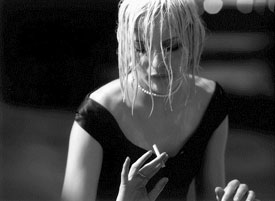 The absurdist extremes of the tale make it a black comedy, yet it's really much more a strange, strange, strange tale of character, the smelly imigrant full of lies & self-deceptions, & the beautiful giantess. The absurdist extremes of the tale make it a black comedy, yet it's really much more a strange, strange, strange tale of character, the smelly imigrant full of lies & self-deceptions, & the beautiful giantess.
And it's a noir romance filmed in gorgeous, glorioius black & white, inspired at least in part by Wim Wenders' Wings of Desire (Der Himmel uber Berlin, 1987) which likewise made such splendid use of black & white cinematography.
And frankly, as awesome as Wim Wenders' film was (weakened though it was by its sequel, & destroyed by its Englished Hollywood remake), Angel-A is a far better & more profound film about the pros &s cons of our earthly conditions, even at the lowest rung.
Wenders seems to have imagined angels desirious of middleclass life & middleclass love, & I was never really convinced one would give up immortality & closeness to God in trade for a good lay & a job making pizzas. Luc Besson by improved comparison seems to imagine humanity much more interesting without the conformity.
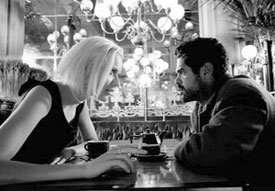 When Angela begins to feel earthy, earthly love for her groddy ward, she becomes afraid of her own potential loss. When Angela begins to feel earthy, earthly love for her groddy ward, she becomes afraid of her own potential loss.
For an angel to fall, to experience earthy things to their core, forces a terrible choice, both of which mean leaving something behind -- whether earthly affection, or Heaven -- as these things cannot exist in harmony for angelic beings.
And it will come down to just that choice, fallen angel who burns her wings, or lonely supernatural being among the clouds. By the end, Andre wants to become her guardian angel, & snatches her literally from heaven.
For me, a viewer slow to embrace love stories unless they're amazingly good ones on several levels, Angel-a was one of the best films ever, sexy, imaginative, tender, aesthetic, vulgar, disarming.
copyright © by Paghat the Ratgirl
|
